The Importance of Prophets – Part 10
In Part One of this series we examined the basic importance of prophets, as well as who and what are the ‘major’ and ‘minor’ prophets of the Word. Additionally, in Parts One and Two we studied the three ‘major’ prophets: Isaiah, Jeremiah, and Ezekiel. Then, we turned our focus to the ‘minor’ prophets in Parts Three, Four, Five, Six, Seven, Eight, and Nine.
In today’s study, we will begin our examination of the ‘Old Testament Prophets…’
Prophets of the Old Testament:
As we have discovered in Part One of this series, there are—according to some sources—two classifications of Old Testament prophets—‘major’ and ‘minor’—whom we have examined thus far.
Yet, while the majority of Old Testament prophets that are featured in more than one or two chapters of the Word fall into these two categories, there are some such as Elijah, Elisha, Samuel, Nathan, and occasionally Daniel who are not categorized as either ‘major’ or ‘minor’ prophets despite their biblical and prophetic importance. We have simply categorized these prophets as ‘Old Testament Prophets.’
Elijah:
Elijah is perhaps THE most famous prophet of the Old Testament, his name being one of the first to spring to mind when someone speaks of prophets. Yet, who was Elijah?
Elijah, whose name means, Jehovah is God, was a prophet called of God. He escaped the wrath of Ahab—King of Israel—and his wife, Jezebel, when the prophets of the Lord were being put to death.
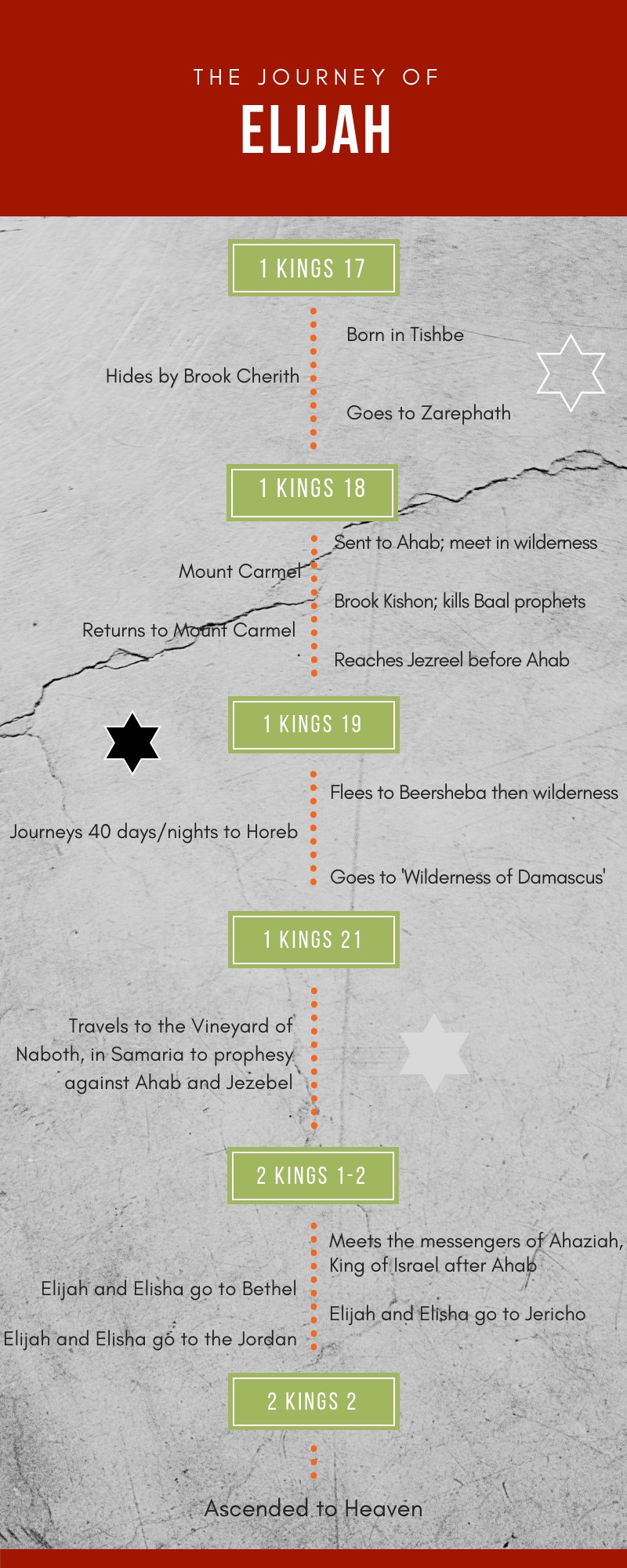
Born in Tishbe, Elijah journeyed far in his lifetime, yet because of his ascension to Heaven, many questions have been raised about Elijah’s prophesied return (see Malachi 4:5)…
Many believe that John the Baptist was either Elijah returned OR one who fulfilled this prophetic vision.
Yet, interestingly one of the main factors people focus on in the question, “Was John the Baptist Elijah returned?” are the similar descriptors in the pair’s appearance. Elijah is described in 2 Kings 1:8 as a hairy man wearing a leather belt about his waist, while John the Baptist is said in Matthew 3:4 to have worn camel’s hair and a leather belt.
However, we do not know if Elijah was actually a very hairy man, or if 2 Kings is referring to his wearing of a hairy garment like John the Baptist. In fact, there are two schools of thought on this biblical question. One, that Elijah was actually physically hairy and that John the Baptist’s clothes harken back to this. Or two, that Elijah wore fur just as John the Baptist would in the future. However, neither answer gives us an answer to the bigger question, “Was John the Baptist Elijah returned?”
Whether John the Baptist was Elijah or not, Elijah of Tishbe had a full life in 9th century BC Samaria. Prophesying to kings, speaking directly to God, performing miracles, being fed by ravens and angels, and of course, witnessing the amazing power of God in all these things and more!
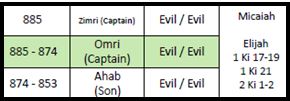
(Left to right: Approximate years of reign (BC); Kings of Israel; Kings’ behaviors; Prophets.)
We first meet Elijah in 1 Kings 17 and follow his life from a prophetic interaction with King Ahab until he ascends to Heaven in 2 Kings 2. Elijah appears in a total of six chapters, aside from mentions of him by others elsewhere.
Through all of this, we find a man who listens to the voice of God and has the courage to obey and follow wholly after God, even when he faces doubt. The relationship with God that this obedience and great faith develops is such that God listens to Elijah, just as Elijah listens to him! Furthermore, God trusts Elijah enough to not only to speak His words, but to perform miracles in an age where few in Israel obey God.
Interestingly though, the first miraculous happenings in Elijah’s life that we read of in the Word happens not through Elijah, but to him. For God sent ravens to feed Elijah after he was told by God to go into hiding at Brook Cherith—when Ahab wanted to take his life for prophesying God’s truth.
Still, the first recorded miracles that God performs through Elijah are found immediately following the miracle at Brook Cherith. Not long after we meet Elijah, he leaves the Brook Cherith, and is led to Zarephath where he meets a certain widow. We see Elijah prophesying and praying miracles into being. First, after the widow gives Elijah all the food she and her son had and he prophesied that the flour and oil would not go dry until God sent rain; then soon after, through Elijah’s prayer to God, her son was brought back to life.
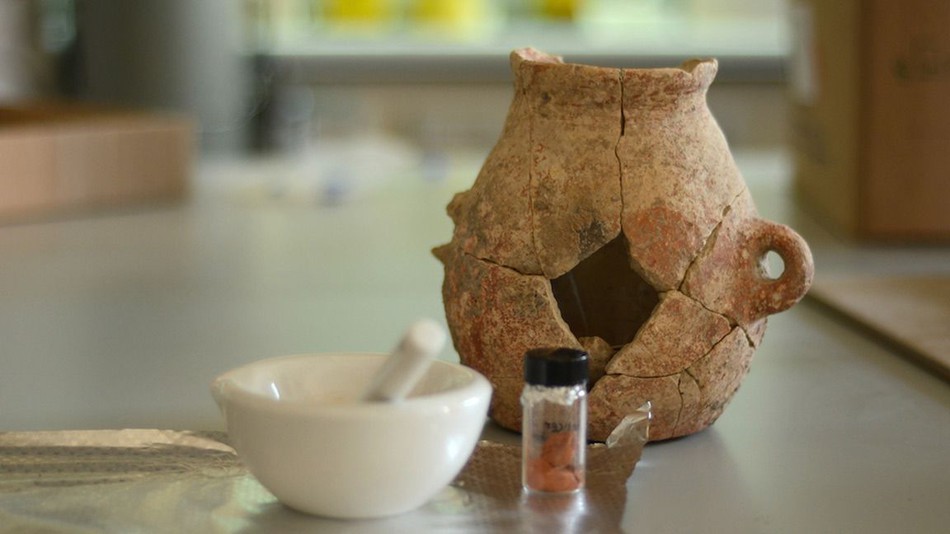
(Source: Israel Antiquities Authority. Clay vessel containing olive oil residue.)
Yet, despite God performing many miracles through Elijah, he was, in his call, a prophet first and foremost. He prophesied to King Ahab on many occasions and even to Ahab’s sons who succeeded him. Elijah’s prophecies not only spoke of the wrath their evils would cause, but of the ends they and Jezebel would meet. Additionally, Elijah even prophesied to a king of Judah who was visiting in Samaria, making a total of four kings that he gave prophecy to in his day… meaning Elijah, while not appreciated by the kings, was still indeed, a prophet to kings.
Nonetheless, while his call was a prophet first and foremost, in his personal life, and indeed as a teaching tool left for us, his one on one relationship with God left perhaps the deepest mark…
One of the best examples being when Elijah stood upon Mount Horeb—in a dream, vision, or reality—and God sent wind, an earthquake, and fire, then finally, a still small voice…
And God was in that voice.
And Elijah, though riddled with fear and doubt, listened.

Elisha:
Elisha, the prophet who assumed Elijah’s mantel when Elijah ascended to Heaven, is a unique prophet in many ways. He was working as a farmer when Elijah came across him, yet further still, he is unique because his call would not have been so great had he not been persistent. His persistence bringing his call not only to fruition, but to a higher level.
First called by Elijah in 1 Kings 19, Elisha—whose name means, God is salvation—was the son of Shaphat, a successful farmer. Elisha knew the importance and privilege of being asked to serve Elijah and was more than willing to go, but he boldly asked Elijah if he could say goodbye to his family first. Elijah, being patient, allows Elisha to go say goodbye to his family that day, yet when we remember Jesus—speaking to His disciple in Matthew 8, who asked to first go bury his father—say, “let the dead bury their own dead,” it is easy to wonder why the answer was so different.
Yet, Elijah had his reasons:
First, the questions presented are different, one of life, one of death—Elisha asking to say goodbye to the living, the disciple of Jesus asking to bury one whose spirit is not there.
Second, only God can judge a man’s heart. Both Elijah and Jesus were in tune with the voice of God, so while Elijah could not in the natural know Elisha’s heart, God did. God chose Elisha knowing that his heart was more than willing for all the trials and joys of following Elijah—and Him—would bring.

Elisha, upon following Elijah, is not seen much in the Word until the end of Elijah’s time on earth, and their final journey from Gilgal, to Bethel, to Jericho, and the Jordan River. Throughout this final journey together, Elijah attempts to get Elisha—as likely did the other servants of Elijah—to stay behind at each stop. Yet Elisha, in tune with God in his own way, knew as Elijah did that Elijah was about to be taken from him by God to Heaven… knowing this, Elisha refuses to leave him, but also goes a step further by not telling Elijah that he knows. The reason for this omission is uncertain, however the outcome after they cross the Jordan together perhaps has something to do with it…
Elijah asked Elisha what blessing Elisha would have before he left him. Elisha, having followed Elijah for some time, asks for what Elijah calls, “a hard thing.”
“And so it was, when they had crossed over, that Elijah said to Elisha, ‘Ask! What may I do for you, before I am taken away from you?’
“Elisha said, ‘Please let a double portion of your spirit be upon me.’
“So he said, ‘You have asked a hard thing. Nevertheless, if you see me when I am taken from you, it shall be so for you; but if not, it shall not be so.’ Then it happened, as they continued on and talked, that suddenly a chariot of fire appeared with horses of fire, and separated the two of them; and Elijah went up by a whirlwind into heaven.”—2 Kings 2:9-11
Yet, it was because Elisha had asked for “a hard thing”—and was persistent enough to stay with Elijah—that his prophetic ministry would be great… having all the relationship with God, all the signs and wonders that Elijah had known, and more.
The first of these miracles being a partner to Elijah’s…
Before Elijah and Elisha crossed the Jordan, Elijah took his mantle, folded it, hit the water with it, and the water parted so they crossed over on dry ground. Elisha, having witnessed Elijah ascend, took Elijah’s mantle that had been left, and with it and the double portion of Elijah’s spirit, performed the same miracle… crossing the Jordan on dry ground! This was to be the first of many miracles that Elisha would perform—in addition to the multitude of prophecies that he would speak out.
Leaving the Jordan, Elisha went to Jericho. The sons of the prophets pestered him to send out fifty men to search for Elijah, for they did not understand all that God had done. While warning them of the futility of this act, he allowed them to go and they returned three days later without finding Elijah. Yet, their lack of understanding put Elisha in the location for his first unique miracle under his new mantle of authority. The cleansing of the waters of Jericho…
“…‘Please notice, the situation of this city is pleasant, as my lord sees; but the water is bad, and the ground barren.’
“And he said, ‘Bring me a new bowl, and put salt in it.’ So they brought it to him. Then he went out to the source of the water, and cast in the salt there, and said, ‘Thus says the Lord: “I have healed this water; from it there shall be no more death or barrenness.”’ So the water remains healed to this day, according to the word of Elisha which he spoke.”—2 Kings 2:19-22
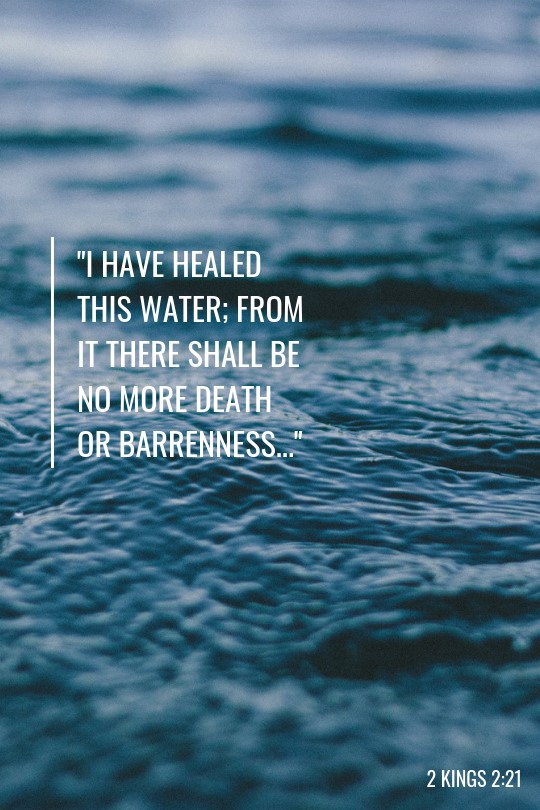
From Jericho, Elisha— like Elijah, traveled far and wide performing miracles, but still focusing on his tasking and call from the Lord: to be a prophet to His people, and most importantly, to the kings who ruled them.
Elisha prophesied to a total of three kings of Israel—only one of whom did any good in the sight of the Lord… but also prophesied to other kings from Judah and beyond. Yet, because of the evil of the kings of Israel, Elisha’s call, like Elijah’s before him, would not be an easy one in the natural. But with the strength of God, it was one he could overcome…
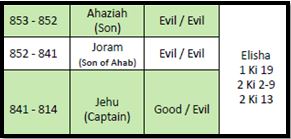
(Left to right: Approximate years of reign (BC); Kings of Israel; Kings’ behaviors; Prophets.)
Interestingly, Elisha’s first prophecy was not only to a king of Israel, but also to the kings of Judah and Edom. These three kings wanted to deal with the rebellion of the Moabites, and sought for a prophet of God, despite the evil of the king of Israel. This act of wisdom and the presence of Jehoshaphat, the king of Judah—who followed after God—led Elisha to give a prophetic word regarding how to beat the Moabites…
“…Thus says the Lord: ‘Make this valley full of ditches.’ For thus says the Lord: ‘You shall not see wind, nor shall you see rain; yet that valley shall be filled with water, so that you, your cattle, and your animals may drink.’ And this is a simple matter in the sight of the Lord; He will also deliver the Moabites into your hand. Also you shall attack every fortified city and every choice city, and shall cut down every good tree, and stop up every spring of water, and ruin every good piece of land with stones.”—2 Kings 3:16-19
So, when the morning came and the grain offering to God was given, the Lord filled the land with water, causing it to appear red as blood to the Moabites, and the Moabites, thinking all their enemies had destroyed one another entered the land without caution, allowing the three kingdoms to attack and do just as the Lord had said.
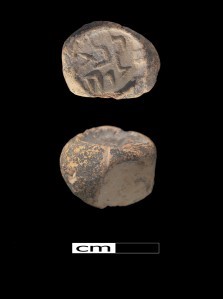
(Found near Jerusalem’s Western Wall this seal reads, ‘Pure of G-D’ and would have been used in the Temple to mark those things considered holy or acceptable to God. The hardened clay impressions this created were possibly used for offerings to signify that an individual’s purchased animal, such as a bull—or other items—to give to God was preapproved as pure—without defect—and ready for sacrifice.)
And so, in all the years of Elisha’s life to follow, he prophesied the word of the Lord to the kings of Israel and performed many miracles; from ones akin to the acts of Elijah—such as the oil not running dry—to ones akin to those Jesus would perform—such as feeding masses with little. Therefore, in all the years of Elisha’s life he followed wholly after the Lord, he helped turn many hearts to God, and gave warning to those who would not turn.
During the course of this series, we will continue to examine the lives of the prophets of the Word. We will see how those of the Old Testament prophesied not only of what was about to occur—or would occur without action—but, how they laid out prophecies which not only came about during the days of Jesus, but are still coming to pass to this day!